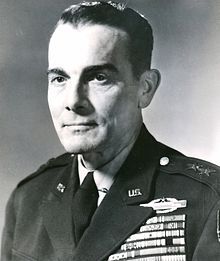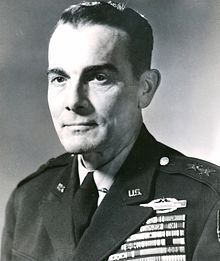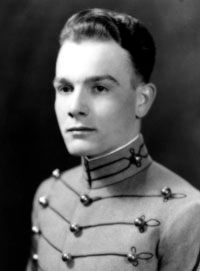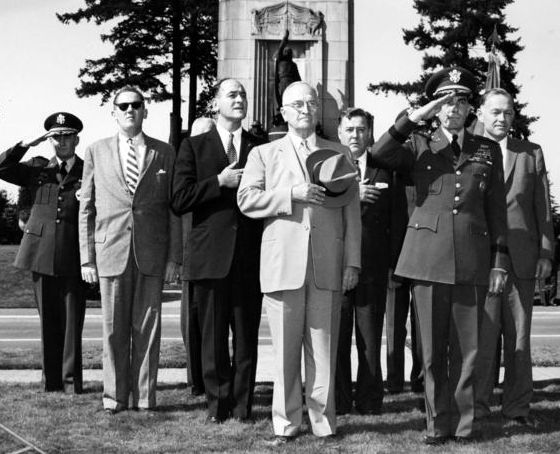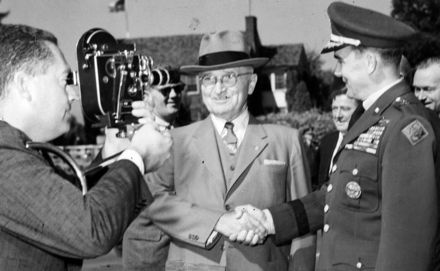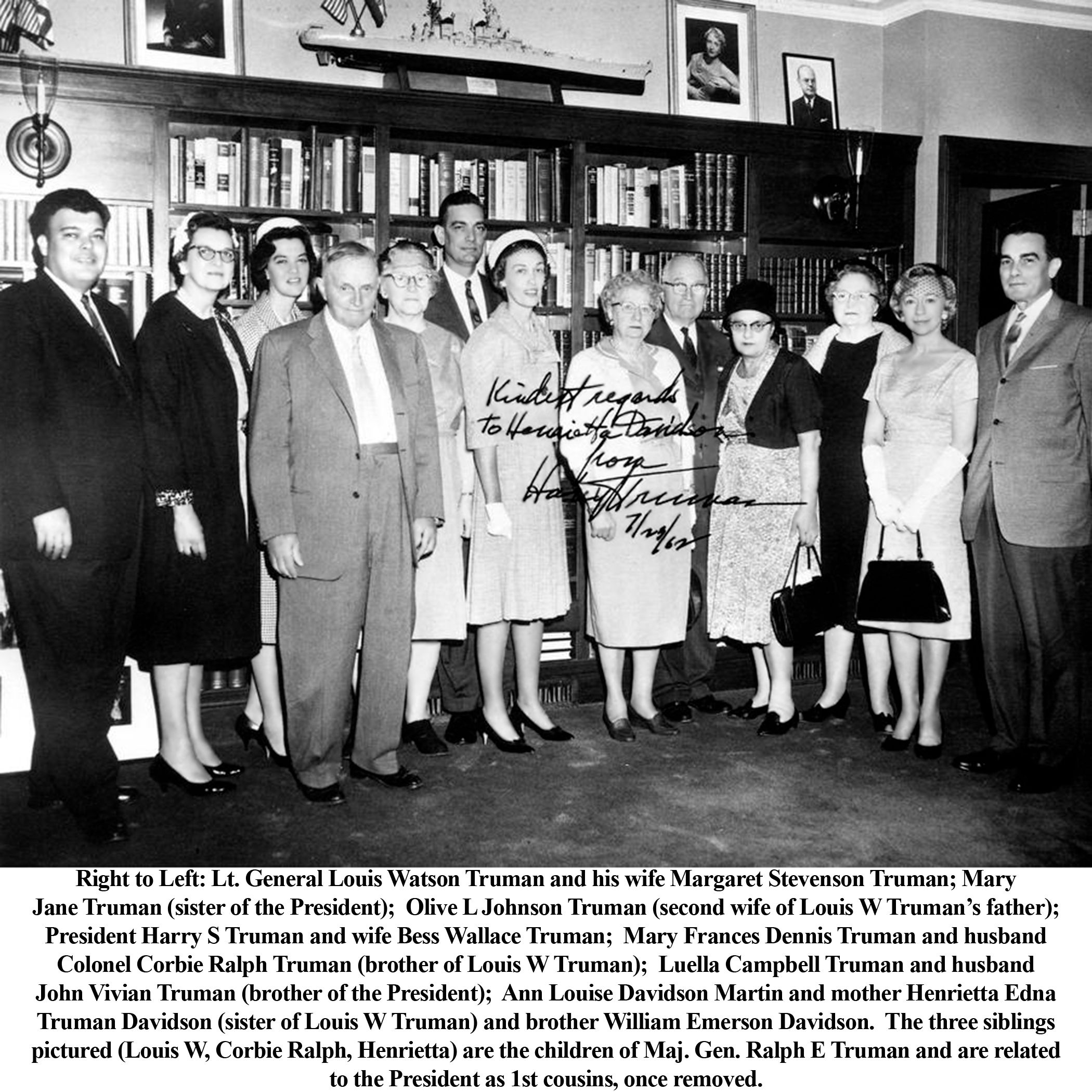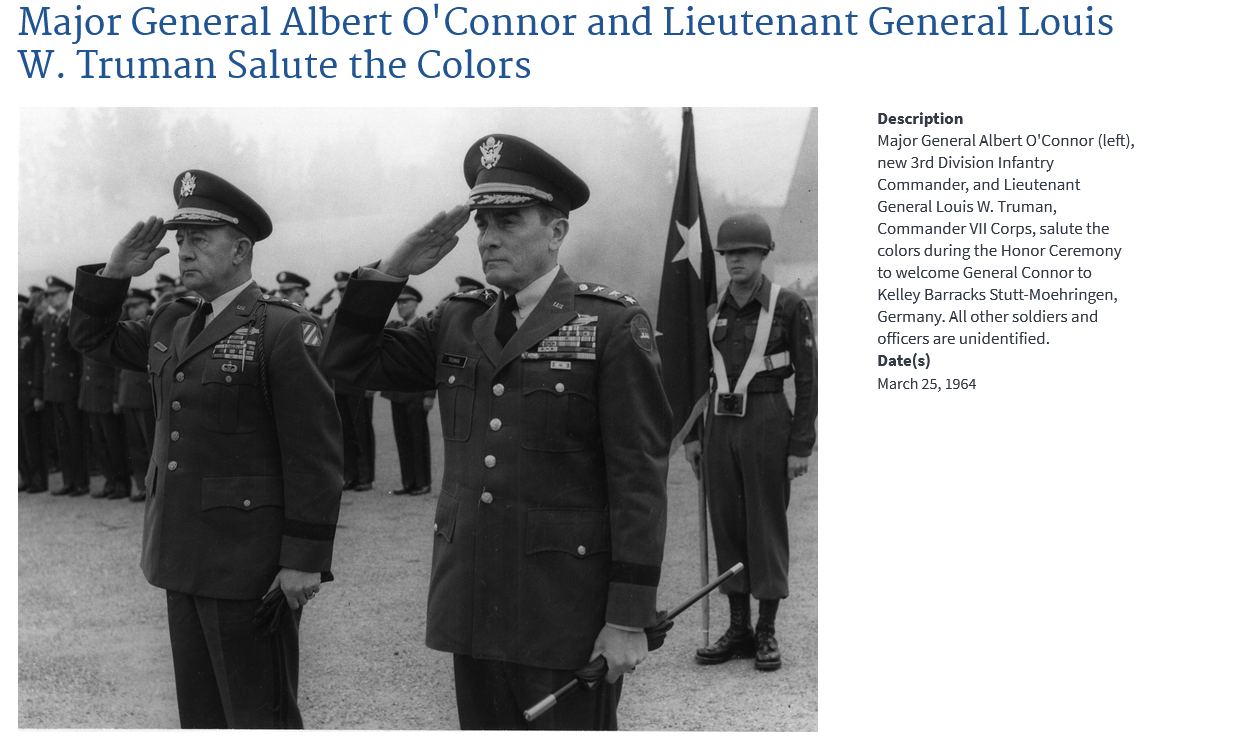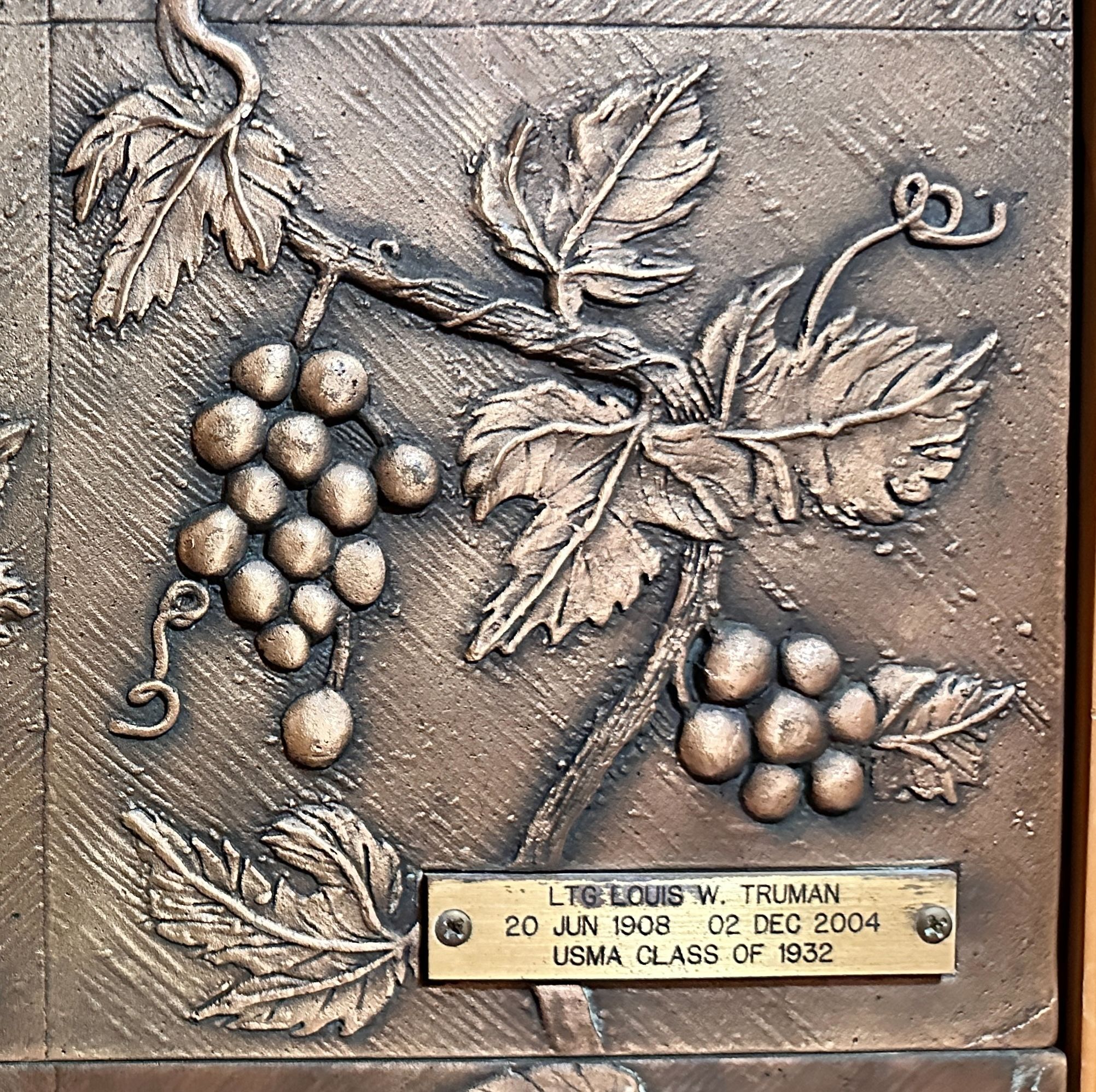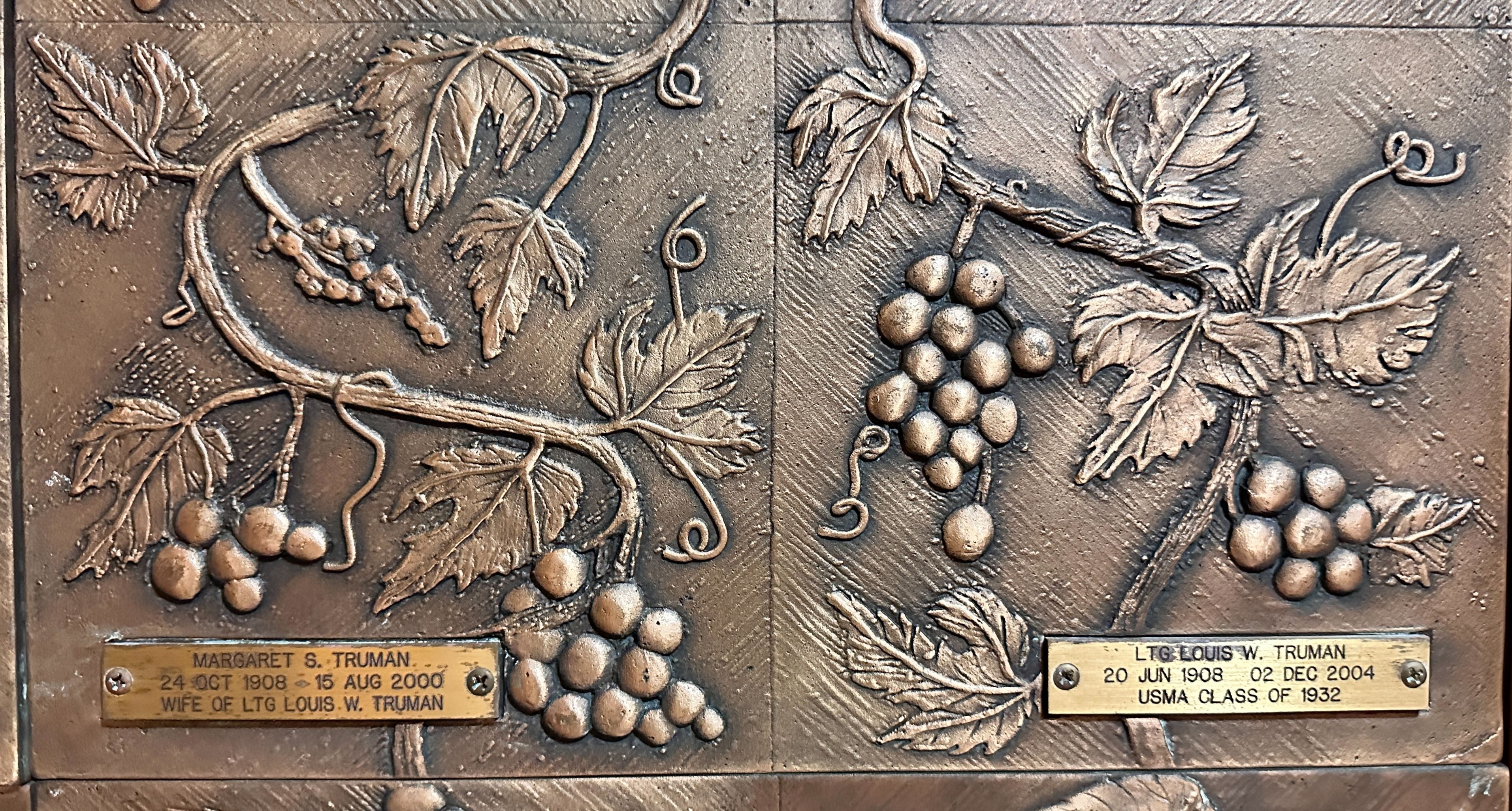At his death in 2004 at age 96, Lt. General Truman was the second oldest survivor of the Pearl Harbor attack on 7 December 1941. On the morning of the attack, he held the rank of Captain and was stationed at Pearl Harbor as aide-de-camp to Gen. Walter Short, the Army commander in charge of the island's land defenses. Truman was preparing to play golf with Short and the commander of the Pacific fleet, Admiral Husband Kimmel, when Japanese fighters and dive bombers attacked, pulling the U.S. into WWII.
Lt. Gen. Louis W. Truman was born June 20, 1908. In 1926, he enlisted in Company E, 140th Infantry, 35th Division, Missouri National Guard. Truman entered the U. S. Military Academy at West Point June 2, 1928 and, upon graduation in 1932, he was commissioned a second lieutenant in the Infantry.
Truman's first duty assignment was the 6th Infantry Regiment at Jefferson Barracks, Mo. During his tenure there, he held several positions. In 1936, then-1st Lt. Truman was assigned to Fort Benning, where he completed the Infantry School and The Tank School. Next, he served a two-year tour of duty at Fort Davis, in the Canal Zone and then returned to Fort Benning, to the 14th Armored brigade, 2nd Armored Division under Brig. Gen. George S. Patton, Commanding.
Truman was promoted to major in February 1942 and was assigned to Headquarters, Army Ground Forces, Washington, DC first as assistant G3 and later as Secretary of the General Staff for Lt. Gen. Lesley J. McNair. In1944, he was selected as Chief of Staff, 84th Infantry Division, Brig. Gen. Alex R. Bolling, commanding. During Truman's tenure as chief of staff, the 84th saw combat along the Siegfried Line, the Bulge, the Ardennes and in Germany from the Roer River to the Elbe River.
In 1946, then-Col. Truman was assigned to HQ, U. S. Forces European Theater, Frankfurt, Germany, as Deputy Theater Chief, Special Services. From 1946 to 1948, Truman was assigned as Secretary, U.S. Delegation, United Nations Military Staff Committee. Truman was a student at the National War College from 1948 to 1949. Following that, he was a member of the Joint Strategic Planning Group, Office of the Joint Chiefs of Staff, The Pentagon, Washington, DC. During this assignment, Gen. Omar Bradley was Chairman of the Joint Chiefs of Staff.
Truman commanded the 223rd Infantry Regiment, 40th Infantry Division from July 1952 to January 1953, in combat in Korea. He later served as assistant division commander of the 2nd Infantry Division until the cessation of hostilities in July1953. From then until 1955, Truman served again with Bolling, this time as chief of staff of Third U. S. Army at Fort McPherson, Ga. That assignment was followed by duty at Naples, Italy, where then-Brig. Gen. Truman was Deputy Chief of Staff - G3, Plans and Operations, NATO Southern Command.
Truman received his second star in 1956 and with it the chairmanship of the Military Assistance Advisory Group, Karachi, Pakistan. He then commanded the 4th Infantry Division in Fort Lewis, Wash., from 1958 until 1960. In 1958 he was assigned as Deputy Chief of Staff Operations and Training and later as Deputy Commanding General, Headquarters, Continental Army Command, Fort Monroe, Va. Concurrent with this latter position, Truman was Commander Joint Task Force.
In 1962, Truman was promoted to lieutenant general and then, from 1963 until 1965, he commanded VII Corps at Kelly Barracks, Stuttgart, Germany. This assignment was followed by his assignment as Commanding General, Third U. S. Army, Fort McPherson, Ga., until his retirement in August 1967.
During his military career, Truman was earned many awards to include: the Distinguished Service Medal, the Silver Star (one oak leaf cluster), the Legion of Merit (one oak leaf cluster), the Bronze Star Medal (two oak leaf clusters), the Army Commendation Medal (one oak leaf cluster) and the Combat Infantryman Badge (two awards).
Following his retirement in 1967, Truman was Commissioner of the Georgia Department of Industry and Trade under governors Maddox, Carter and Busbee. From 1976 until 1984, Truman served as vice president and special assistant to the president of Adams/Cates Realty in Atlanta.
He resided in Atlanta since his Army retirement in 1967 after 37 years of active duty. Born June 20, 1908 in Kansas City, MO. He was preceded in death by his parents, Maj. Gen. Ralph Emerson Truman, Nanny Louise Watson Truman, his brother Col. Corbie Truman, his sister, Henrietta Truman Davidson, and his first wife, Margret Stevenson Truman. After the death of his first wife, he was married a second time to Anastasia Poulos.
Louis Truman's grandfather was William Thomas Truman, who was President Harry S Truman's uncle. Thus Louis was related to the President as a first cousin, once removed. Louis happened to be stationed in Washington, DC at the Pentagon during part of President Truman's tenure and visited with him occasionally.
Credit to SGT Bobby Scroggins and the website TogetherWeServed.com for much of the material in this biography.
At his death in 2004 at age 96, Lt. General Truman was the second oldest survivor of the Pearl Harbor attack on 7 December 1941. On the morning of the attack, he held the rank of Captain and was stationed at Pearl Harbor as aide-de-camp to Gen. Walter Short, the Army commander in charge of the island's land defenses. Truman was preparing to play golf with Short and the commander of the Pacific fleet, Admiral Husband Kimmel, when Japanese fighters and dive bombers attacked, pulling the U.S. into WWII.
Lt. Gen. Louis W. Truman was born June 20, 1908. In 1926, he enlisted in Company E, 140th Infantry, 35th Division, Missouri National Guard. Truman entered the U. S. Military Academy at West Point June 2, 1928 and, upon graduation in 1932, he was commissioned a second lieutenant in the Infantry.
Truman's first duty assignment was the 6th Infantry Regiment at Jefferson Barracks, Mo. During his tenure there, he held several positions. In 1936, then-1st Lt. Truman was assigned to Fort Benning, where he completed the Infantry School and The Tank School. Next, he served a two-year tour of duty at Fort Davis, in the Canal Zone and then returned to Fort Benning, to the 14th Armored brigade, 2nd Armored Division under Brig. Gen. George S. Patton, Commanding.
Truman was promoted to major in February 1942 and was assigned to Headquarters, Army Ground Forces, Washington, DC first as assistant G3 and later as Secretary of the General Staff for Lt. Gen. Lesley J. McNair. In1944, he was selected as Chief of Staff, 84th Infantry Division, Brig. Gen. Alex R. Bolling, commanding. During Truman's tenure as chief of staff, the 84th saw combat along the Siegfried Line, the Bulge, the Ardennes and in Germany from the Roer River to the Elbe River.
In 1946, then-Col. Truman was assigned to HQ, U. S. Forces European Theater, Frankfurt, Germany, as Deputy Theater Chief, Special Services. From 1946 to 1948, Truman was assigned as Secretary, U.S. Delegation, United Nations Military Staff Committee. Truman was a student at the National War College from 1948 to 1949. Following that, he was a member of the Joint Strategic Planning Group, Office of the Joint Chiefs of Staff, The Pentagon, Washington, DC. During this assignment, Gen. Omar Bradley was Chairman of the Joint Chiefs of Staff.
Truman commanded the 223rd Infantry Regiment, 40th Infantry Division from July 1952 to January 1953, in combat in Korea. He later served as assistant division commander of the 2nd Infantry Division until the cessation of hostilities in July1953. From then until 1955, Truman served again with Bolling, this time as chief of staff of Third U. S. Army at Fort McPherson, Ga. That assignment was followed by duty at Naples, Italy, where then-Brig. Gen. Truman was Deputy Chief of Staff - G3, Plans and Operations, NATO Southern Command.
Truman received his second star in 1956 and with it the chairmanship of the Military Assistance Advisory Group, Karachi, Pakistan. He then commanded the 4th Infantry Division in Fort Lewis, Wash., from 1958 until 1960. In 1958 he was assigned as Deputy Chief of Staff Operations and Training and later as Deputy Commanding General, Headquarters, Continental Army Command, Fort Monroe, Va. Concurrent with this latter position, Truman was Commander Joint Task Force.
In 1962, Truman was promoted to lieutenant general and then, from 1963 until 1965, he commanded VII Corps at Kelly Barracks, Stuttgart, Germany. This assignment was followed by his assignment as Commanding General, Third U. S. Army, Fort McPherson, Ga., until his retirement in August 1967.
During his military career, Truman was earned many awards to include: the Distinguished Service Medal, the Silver Star (one oak leaf cluster), the Legion of Merit (one oak leaf cluster), the Bronze Star Medal (two oak leaf clusters), the Army Commendation Medal (one oak leaf cluster) and the Combat Infantryman Badge (two awards).
Following his retirement in 1967, Truman was Commissioner of the Georgia Department of Industry and Trade under governors Maddox, Carter and Busbee. From 1976 until 1984, Truman served as vice president and special assistant to the president of Adams/Cates Realty in Atlanta.
He resided in Atlanta since his Army retirement in 1967 after 37 years of active duty. Born June 20, 1908 in Kansas City, MO. He was preceded in death by his parents, Maj. Gen. Ralph Emerson Truman, Nanny Louise Watson Truman, his brother Col. Corbie Truman, his sister, Henrietta Truman Davidson, and his first wife, Margret Stevenson Truman. After the death of his first wife, he was married a second time to Anastasia Poulos.
Louis Truman's grandfather was William Thomas Truman, who was President Harry S Truman's uncle. Thus Louis was related to the President as a first cousin, once removed. Louis happened to be stationed in Washington, DC at the Pentagon during part of President Truman's tenure and visited with him occasionally.
Credit to SGT Bobby Scroggins and the website TogetherWeServed.com for much of the material in this biography.
